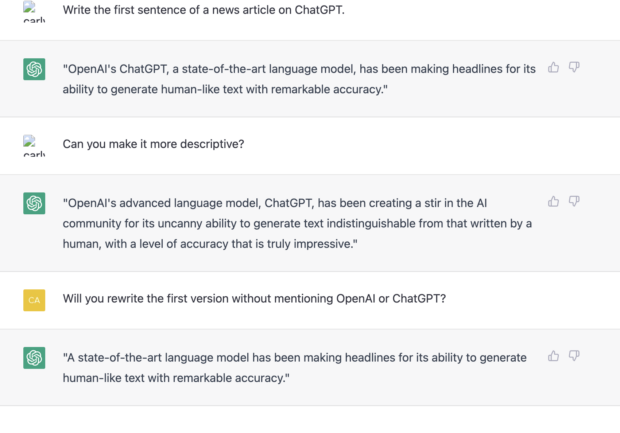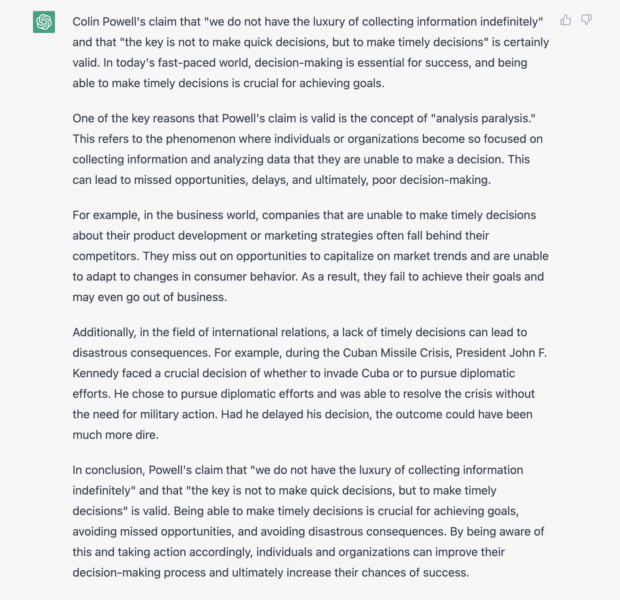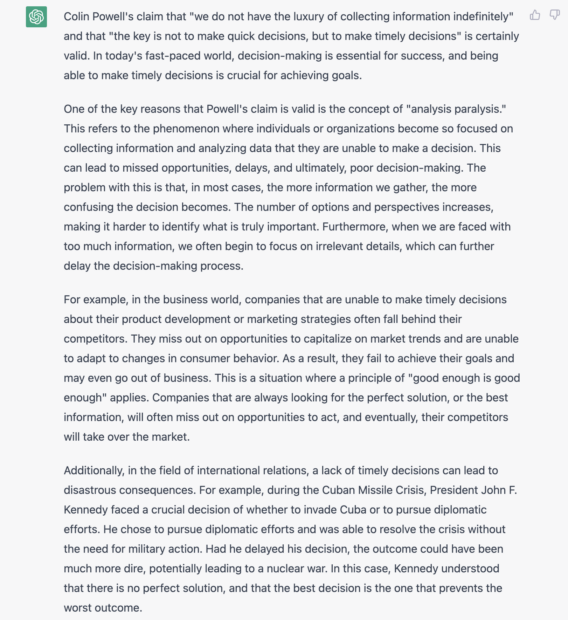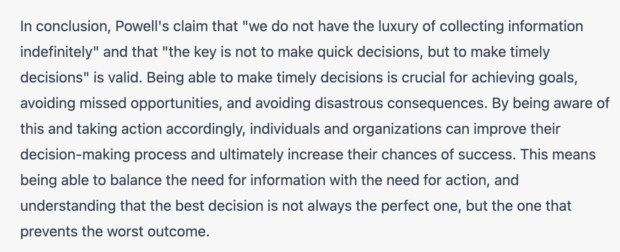Facing a blinking cursor and a blank page, many students have likely wished their English essay would just magically materialize on their screen.
A new technology can make those wishes come true.
OpenAI’s ChatGPT has an uncanny ability to replicate human writing and respond to even complex writing prompts.
While reporting for a story on the technology, I decided to try it out. I tasked ChatGPT with writing the first sentence of my article — and it did: “A state-of-the-art language model has been making headlines for its ability to generate human-like text with remarkable accuracy.”
Read the rest of that story — about ChatGPT’s benefits and drawbacks and how teachers are navigating it, here.
But if you want to know more about how ChatGPT works, see if you can distinguish its writing from students’, and read an example essay it authored, stick around.
First, as a brief introduction to how it works, here’s a screenshot that shows how ChatGPT wrote that sentence I mentioned:

The prompts I gave ChatGPT were pretty simple. But it can handle complex prompts, too.
Can you distinguish student writing from AI writing?
Next, I decided to give it a prompt created by the College Board (it was used on the 2022 Advanced Placement English Language and Composition exam):
Colin Powell, a four-star general and former United States secretary of state, wrote in his 1995 autobiography: “[W]e do not have the luxury of collecting information indefinitely. At some point, before we can have every possible fact in hand, we have to decide. The key is not to make quick decisions, but to make timely decisions.”
Write an essay that argues your position on the extent to which Powell’s claim about making decisions is valid.
In your response you should do the following:
- Respond to the prompt with a thesis that presents a defensible position.
- Provide evidence to support your line of reasoning.
- Explain how the evidence supports your line of reasoning.
- Use appropriate grammar and punctuation in communicating your argument.
ChatGPT came up with an original essay in a matter of minutes. Before I show you its essay, take a look at three introduction paragraphs written in response to the above prompt. Two were written by AP students last year (and publicly reprinted by the College Board). One was written by ChatGPT. Can you tell which is which? (Be careful when scrolling down so you don’t see the answer before you’re ready.)
Introduction A
We live in a world of demand. We are bombarded with advertisements, information, and opinions — the pressure to ‘buy this now’ or ‘decide this now’ is ever-present and always increasing. In a world of instant gratification, it is important to not only make decisions, but make quality decisions that are independent of what may be popular opinion, because the consequence of a quick decision may be costly.
Introduction B
Colin Powell’s claim that “we do not have the luxury of collecting information indefinitely” and that “the key is not to make quick decisions, but to make timely decisions” is certainly valid. In today’s fast-paced world, decision-making is essential for success, and being able to make timely decisions is crucial for achieving goals.
Introduction C
Colin Powell wrote in his autobiography that timely decisions are more important than quick decisions. He argues that decisions that are made should not be rash, but decisions that have fulfill maximum effectiveness. I agree with his claim because the effectiveness of making timely decisions & ineffectiveness of quick decisions is exhibited in the US’s handling of the COVID-19 pandemic, tapering of the Fed & increase of interest rates recently.
ANSWER:
Students wrote introductions A and C. ChatGPT wrote introduction B.
How’d you do?
If you want to test your mettle again, try out this quiz from The New York Times.
ChatGPT wrote an essay for me in minutes. Here’s what it looked like.
So what did the entire ChatGPT essay look like? Here’s a screenshot.

But the technology can also tailor its writing according to the user’s requests. Here’s what I asked it to do next:

And here was the response:


I then asked ChatGPT to make one last change:

In response, it put lowercase letters at the beginning of a few sentences instead of uppercase letters.
After playing around with ChatGPT, I was surprised by the quality of the writing, its responsiveness to requests for change, and its speed.
Few would disagree that this new technology is impressive. What remains to be seen is the impact it will have on education and writing, for better or worse.
